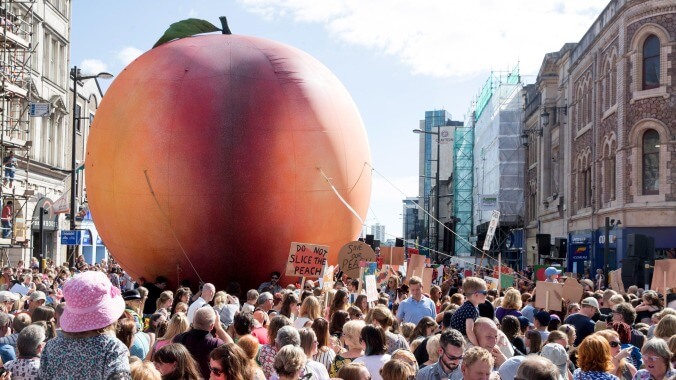Fans react to publisher efforts to edit in a kinder, gentler Roald Dahl
Excerpts from the most recent editions of Dahl's books are making the rounds online today

Underneath all of the wondrous chocolate factories and champion-level pheasant killing, there’s always been a core of nastiness powering the works of beloved British author Roald Dahl. It’s at least part of why kids have gravitated to his books for decades at this point: In a world of kids’ lit where everything tends to be stultifyingly nice, Dahl was unafraid to be mean-spirited, sometimes even cruel. Sometimes that manifested in ways that were wildly out-of-step with modern (or even contemporary) mores—looking at you, original version of the Oompa-Loompas, depicted in the first editions of Charlie And The Chocolate Factory as happily enslaved African people—and at other times with a witty subversiveness that could feel like an escape hatch for child readers constantly being told to be well-behaved or nice.
Dahl’s works, and modern reactions to them, are back in the spotlight today, after The Guardian and The Daily Telegraph ran pieces in the U.K. about new versions of many of the author’s books, updated over the last year or so in response to suggestions from a crew of sensitivity readers (and with permission and endorsement from the author’s estate). From the compilations of changes that are floating around online, it looks like much of the focus by editors at Puffin was on removing certain words—“fat” and “ugly” have both been omitted from multiple works—and to push back on potential sexism. (Instances of “men” as a general noun have now been changed to “people,” and there are multiple instances of actions attributed to “Dad” or “Mom” along old-school gender lines now being attributed to both parents.)
But there are also longer instances of excisions, including altering some of the poetry in James And The Giant Peach to remove references to one of the villains’ weight, changing out the old rhymes for new ones entirely. Again, none of this is unprecedented: The original Oompa-Loompa material, for instance, was changed in the 1970s by Dahl himself, after the NAACP protested the depiction from the book’s first edition. But it hasn’t stopped fans of Dahl’s books from passing around excerpts today of new versions of his work in which Matilda is no longer a fan of Joseph Conrad or Rudyard Kipling, or a version of The Witches that goes to pains to remind you that there are lots of good reasons for a woman to wear a wig that have nothing to do with her being a monster with an insatiable desire to murder children.
Per Rolling Stone, the Roald Dahl Story Group issued a statement this week in reference to the changes.
When publishing new print runs of books written years ago, it’s not unusual to review the language used alongside updating other details including a book’s cover and page layout. Our guiding principle throughout has been to maintain the storylines, characters, and the irreverence and sharp-edged spirit of the original text. Any changes made have been small and carefully considered.